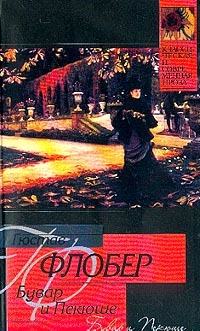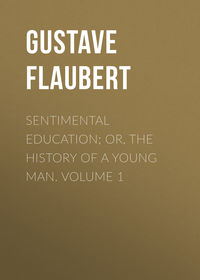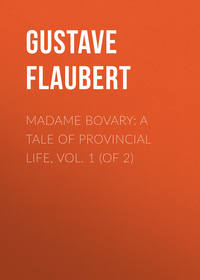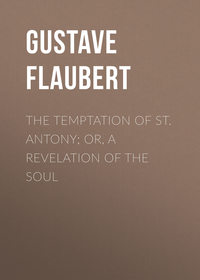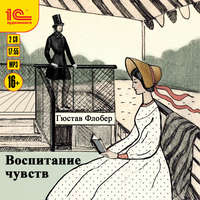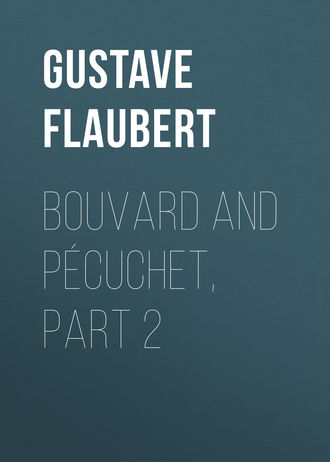 полная версия
полная версияBouvard and Pécuchet, part 2
“Explain this to me.”
This was the phrase she used after her marvellous tales, which she declared to be true, with the obstinacy of a mule. Apart from this she was a harmless woman of lively disposition.
On one occasion, however, she deviated from her character.
Bouvard was disputing with her about the miracle of Pezilla: this was a fruit-dish in which wafers had been hidden during the Revolution and which had become gilded of itself.
“Perhaps there was at the bottom a little yellow colour caused by humidity?”
“Not at all! I repeat it, there was not! The cause of the gilding was the contact with the Eucharist.”
By way of proof she relied on the attestations of bishops.
“It is, they say, like a buckler, a – a palladium over the diocese of Perpignan. Ask Monsieur Jeufroy, then!”
Bouvard could not stand this kind of talk any longer; and, after he had looked over his Louis Hervieu, he took Pécuchet off with them.
The clergyman was finishing his dinner. Reine offered them chairs, and, at a gesture from her master, she went to fetch two little glasses, which she filled with Rosolio.
After this Bouvard explained what had brought him there.
The abbé did not reply candidly.
“Everything is possible to God, and the miracles are a proof of religion.”
“However, there are laws of nature – ”
“That makes no difference to Him. He sets them aside in order to instruct, to correct.”
“How do you know whether He sets them aside?” returned Bouvard. “So long as Nature follows her routine we never bestow a thought on it, but in an extraordinary phenomenon we believe we see the hand of God.”
“It may be there,” replied the ecclesiastic; “and when an occurrence has been certified by witnesses – ”
“The witnesses swallow everything, for there are spurious miracles.”
The priest grew red.
“Undoubtedly; sometimes.”
“How can we distinguish them from the genuine ones? If the genuine ones, given as proofs, have themselves need of proofs, why perform them?”
Reine interposed, and, preaching like her master, said it was necessary to obey.
“Life is a passage, but death is eternal.”
“In short,” suggested Bouvard, guzzling the Rosolio, “the miracles of former times are not better demonstrated than the miracles of to-day; analogous reasonings uphold those of Christians and Pagans.”
The curé flung down his fork on the table.
“Again I tell you those miracles were spurious! There are no miracles outside of the Church.”
“Stop!” said Pécuchet, “that is the same argument you used regarding the martyrs: the doctrine rests on the facts and the facts on the doctrine.”
M. Jeufroy, having swallowed a glass of water, replied:
“Even while denying them you believe in them. The world which twelve fishermen converted – look at that! it seems to me a fine miracle.”
“Not at all!”
Pécuchet gave a different account of the matter: “Monotheism comes from the Hebrews; the Trinity from the Indians; the Logos belongs to Plato, and the Virgin Mother to Asia.”
No matter! M. Jeufroy clung to the supernatural and did not desire that Christianity should have humanly the least reason for its existence, though he saw amongst all peoples foreshadowings or deformations of it. The scoffing impiety of the eighteenth century he would have tolerated, but modern criticism, with its politeness, exasperated him.
“I prefer the atheist who blasphemes to the sceptic who cavils.”
Then he looked at them with an air of bravado, as if to dismiss them.
Pécuchet returned home in a melancholy frame of mind. He had hoped for a reconciliation between faith and reason.
Bouvard made him read this passage from Louis Hervieu:
“In order to know the abyss which separates them, oppose their axioms.
“Reason says to you: ‘The whole comprehends the part,’ and faith replies to you: ‘By substantiation, Jesus, while communicating with the apostles, had His body in His hand and His head in His mouth.’
“Reason says to you: ‘No one is responsible for the crime of another,’ and faith replies to you: ‘By original sin.’
“Reason says to you: ‘Three make three,’ and faith declares that ‘Three make one.’ ”
They no longer associated with the abbé.
It was the period of the war with Italy. The respectable people were trembling for the Pope. They were thundering against Victor Emmanuel. Madame de Noares went so far as to wish for his death. Bouvard and Pécuchet alone protested timidly.
When the door of the drawing-room flew open in front of them and they looked at themselves in the lofty mirrors, as they passed, whilst through the windows they caught a glimpse of the walks where glared above the grass the red waistcoat of a man-servant, they felt a sensation of delight; and the luxuriousness of their surroundings rendered them indulgent to the words that were uttered there.
The count lent them all the works of M. de Maistre. He expounded the principles contained in them before a circle of intimate friends – Hurel, the curé, the justice of the peace, the notary, and the baron, his future son-in-law, who used to come from time to time for twenty-four hours to the château.
“What is abominable,” said the count, “is the spirit of ’eighty-nine. First of all they question the existence of God; then they dispute about government; then comes liberty – liberty for insults, for revolt, for enjoyments, or rather for plunder, so that religion and authority ought to proscribe the independents, the heretics. No doubt they will protest against what they call persecution, as if the executioners persecuted the criminals. Let me resume: No State without God! the law being unable to command respect unless it comes from on high, and, in fact, it is not a question of the Italians, but of determining which shall have the best of it, the Revolution or the Pope, Satan or Jesus Christ.”
M. Jeufroy expressed his approval by monosyllables, Hurel by means of a smile, and the justice of the peace by nodding his head. Bouvard and Pécuchet kept their eyes fixed on the ceiling; Madame de Noares, the countess, and Yolande were making clothes for the poor, and M. de Mahurot, beside his betrothed, was turning over the leaves of a book.
Then came intervals of silence, during which everyone seemed to be absorbed in the investigation of a problem. Napoleon III. was no longer a saviour, and he had even given a deplorable example by allowing the masons at the Tuileries to work on Sunday.
“It ought not to be permitted,” was the ordinary phrase of the count.
Social economy, fine arts, literature, history, scientific doctrines – on all he decided in his quality of Christian and father of a family; and would to God that the government, in this respect, exercised the same severity that he exhibited in his household! Authority alone is the judge of the dangers of science: spread too extensively, it inspires fatal ambitions in the breasts of the people. They were happier, these poor people, when the nobles and the bishops tempered the absolutism of the king. The manufacturers now make use of them. They are on the point of sinking into slavery.
And all looked back with regret to the old régime, Hurel through meanness, Coulon through ignorance, Marescot as a man of artistic tastes.
Bouvard, when he found himself at home once more, fortified his mind with a course of Lamettrie, Holbach, and others; whilst Pécuchet forsook a religion which had become a medium of government.
M. de Mahurot had communicated in order the better to charm the ladies, and, if he adopted it as a practice, it was in the interests of the servants.
A mathematician and dilettante, who played waltzes on the piano and admired Topffer, he was distinguished by a tasteful scepticism. What was said about feudal abuses, the Inquisition, and the Jesuits, was the result of prejudice. He extolled progress, though he despised everyone who was not a gentleman, or who had not come from the Polytechnic School!
M. Jeufroy likewise displeased the two friends. He believed in sorcery, made jokes about idolatry, declared that all idioms are derived from the Hebrew. His rhetoric lacked the element of novelty: it was invariably the stag at bay, honey and absinthe, gold and lead, perfumes, urns, and the comparison of the Christian soul to the soldier who ought to say in the face of sin: “Thou shalt not pass!”
In order to avoid his discourses they used to come to the château at as late an hour as possible.
One day, however, they encountered him there. He had been an hour awaiting his two pupils. Suddenly Madame de Noares entered.
“The little girl has disappeared. I am bringing Victor in. Ah! the wretch!”
She had found in his pocket a silver thimble which she had lost three days ago. Then, stifled with sobs:
“That is not all! While I was giving him a scolding, he turned his back on me!”
And, ere the count and countess could have said a word:
“However, it is my own fault: pardon me!”
She had concealed from them the fact that the two orphans were the children of Touache, who was now in prison.
What was to be done?
If the count sent them away they would be lost, and his act of charity would be taken for a caprice.
M. Jeufroy was not surprised. Since man is corrupt, our natural duty is to punish him in order to improve him.
Bouvard protested. Leniency was better. But the count once more expatiated on the iron hand indispensable for children as well as for the people. These two children were full of vices – the little girl was untruthful, the boy brutish. This theft, after all, might have been excused, the impertinence never. Education should be the school of respect.
Therefore Sorel, the gamekeeper, would immediately administer to the youngster a good flogging.
M. de Mahurot, who had something to say to him, undertook the commission. He went to the anteroom for a gun, and called Victor, who had remained in the centre of the courtyard with downcast head.
“Follow me,” said the baron. As the way to the gamekeeper’s lodge turned off a little from Chavignolles, M. Jeufroy, Bouvard, and Pécuchet accompanied him.
At a hundred paces from the château, he begged them not to speak any more while he was walking along the wood.
The ground sloped down to the river’s edge, where rose great blocks of stone. At sunset they looked like slabs of gold. On the opposite side the green hillocks were wrapped in shadow. A keen wind was blowing. Rabbits came out of their burrows, and began browsing on the grass.
A shot went off; a second; a third: and the rabbits jumped up, then rolled over. Victor flung himself on them to seize hold of them, and panted, soaking with perspiration.
“You have your clothes in nice condition!” said the baron.
There was blood on his ragged blouse.
Bouvard shrank from the sight of blood. He would not admit that it ever should be shed.
M. Jeufroy returned:
“Circumstances sometimes make it necessary. If the guilty person does not give his own, there is need of another’s – a truth which the Redemption teaches us.”
According to Bouvard, it had been of hardly any use, since nearly all mankind would be damned, in spite of the sacrifice of Our Lord.
“But every day He renews it in the Eucharist.”
“And whatever be the unworthiness of the priest,” said Pécuchet, “the miracle takes place at the words.”
“There is the mystery, sir.”
Meanwhile Victor had riveted his eyes on the gun, and he even tried to touch it.
“Down with your paws!” And M. de Mahurot took a long path through the wood.
The clergyman had placed Pécuchet on one side of him and Bouvard at the other, and said to the latter:
“Attention, you know. Debetur pueris.”
Bouvard assured him that he humbled himself in the presence of the Creator, but was indignant at their having made Him a man. We fear His vengeance; we work for His glory. He has every virtue: an arm, an eye, a policy, a habitation.
“ ‘Our Father, who art in heaven,’ what does that mean?”
And Pécuchet added: “The universe has become enlarged; the earth is no longer its central point. It revolves amongst an infinite multitude of other worlds. Many of them surpass it in grandeur, and this belittlement of our globe shows a more sublime ideal of God.
“So, then, religion must change. Paradise is something infantile, with its blessed always in a state of contemplation, always chanting hymns, and looking from on high at the tortures of the damned. When one reflects that Christianity had for its basis an apple!”
The curé was annoyed. “Deny revelation; that would be simpler.”
“How do you make out that God spoke?” said Bouvard.
“Prove that he did not speak!” said M. Jeufroy.
“Once again, who affirms it?”
“The Church.”
“Nice testimony!”
This discussion bored M. de Mahurot, and, as he walked along: “Pray listen to the curé. He knows more than you.”
Bouvard and Pécuchet made signs to indicate that they were taking another road; then, at Croix-Verte:
“A very good evening.”
“Your servant,” said the baron.
All this would be told to M. de Faverges, and perhaps a rupture would result. So much the worse. They felt that they were despised by those people of rank. They were never asked to dinner, and they were tired of Madame de Noares, with her continual remonstrances.
They could not, however, keep the De Maistre; and a fortnight after they returned to the château, not expecting to be welcomed, but they were. All the family were in the boudoir, and amongst those present were Hurel and, strangely enough, Foureau.
Correction had failed to correct Victor. He refused to learn his catechism; and Victorine gave utterance to vulgar words. In short, the boy should go to a reformatory, and the girl to a nunnery. Foureau was charged with carrying out the measure, and he was about to go when the countess called him back.
They were waiting for M. Jeufroy to fix the date of the marriage, which was to take place at the
mayor’s office before being celebrated in the church, in order to show that they looked on civil marriage with contempt.
Foureau tried to defend it. The count and Hurel attacked it. What was a municipal function beside a priesthood? – and the baron would not have believed himself to be really wedded if he had been married only in the presence of a tri-coloured scarf.
“Bravo!” said M. Jeufroy, who had just come in. “Marriage having been established by Jesus Christ – ”
Pécuchet stopped him: “In which Gospel? In the Apostolic times they respected it so little that Tertullian compares it to adultery.”
“Oh! upon my word!”
“Yes, certainly! and it is not a sacrament. A sign is necessary for a sacrament. Show me the sign in marriage.”
In vain did the curé reply that it represented the union of God with the Church.
“You do not understand Christianity either! And the law – ”
“The law preserves the stamp of Christianity,” said M. de Faverges. “Without that, it would permit polygamy.”
A voice rejoined: “Where would be the harm?”
It was Bouvard, half hidden by a curtain.
“You might have many wives, like the Patriarchs, the Mormons, the Mussulmans, and nevertheless be an honest man.”
“Never!” exclaimed the priest; “honesty consists in rendering what is due. We owe homage to God. So he who is not a Christian is not honest.”
“Just as much as others,” said Bouvard.
The count, believing that he saw in this rejoinder an attack on religion, extolled it. It had set free the slaves.
Bouvard referred to authorities to prove the contrary:
“St. Paul recommends them to obey their masters as they would obey Jesus. St. Ambrose calls servitude a gift of God. Leviticus, Exodus, and the Councils have sanctioned it. Bossuet treats it as a part of the law of nations. And Monseigneur Bouvier approves of it.”
The count objected that, none the less, Christianity had developed civilisation.
“Ay, and idleness, by making a virtue of poverty.”
“However, sir, the morality of the Gospel?”
“Ha! ha! not so moral! Those who labour only during the last hour are paid as much as those who labour from the first hour. To him who hath is given, and from him who hath not is taken away. As for the precept of receiving blows without returning them and of letting yourself be robbed, it encourages the audacious, the cowardly, and the dissolute.”
They were doubly scandalised when Pécuchet declared that he liked Buddhism as well.
The priest burst out laughing.
“Ha! ha! ha! Buddhism!”
Madame de Noares lifted up her hands: “Buddhism!”
“What! Buddhism!” repeated the count.
“Do you understand it?” said Pécuchet to M. Jeufroy, who had become confused. “Well, then, learn something about it. Better than Christianity, and before it, it has recognised the nothingness of earthly things. Its practices are austere, its faithful more numerous than the entire body of Christians; and, as for incarnation, Vishnu had not merely one, but nine of them. So judge.”
“Travellers’ lies!” said Madame de Noares.
“Backed up by the Freemasons!” added the curé.
And all talking at the same time:
“Come, then, go on!”
“Very pretty!”
“For my part, I think it funny!”
“Not possible!”
Finally, Pécuchet, exasperated, declared that he would become a Buddhist!
“You are insulting Christian ladies,” said the baron.
Madame de Noares sank into an armchair. The countess and Yolande remained silent. The count kept rolling his eyes; Hurel was waiting for his orders. The abbé, to contain himself, read his breviary.
This sight calmed M. de Faverges; and, looking at the two worthies:
“Before you find fault with the Gospel, and that when there may be stains on your own lives, there is some reparation – ”
“Reparation?”
“For stains?”
“Enough! gentlemen. You don’t understand me.” Then, addressing Foureau: “Sorel is informed about it. Go to him.”
Bouvard and Pécuchet withdrew without bowing.
At the end of the avenue they all three gave vent to their indignation.
“They treated me as if I were a servant,” grumbled Foureau; and, as his companions agreed with him, in spite of their recollection of the affair of the hemorrhoids, he exhibited towards them a kind of sympathy.
Road-menders were working in the neighbourhood. The man who was over them drew near: it was Gorju. They began to chat.
He was overseeing the macadamisation of the road, voted in 1848, and he owed this post to M. de Mahurot, the engineer. “The one that’s going to marry Mademoiselle de Faverges. I suppose ’tis from the house below you were just coming?”
“For the last time,” said Pécuchet gruffly.
Gorju assumed an innocent air. “A quarrel! Come, come!”
And if they could have seen his countenance when they had turned on their heels, they might have observed that he had scented the cause of it.
A little further on, they stopped before a trellised enclosure, inside which there were kennels, and also a red-tiled cottage.
Victorine was on the threshold. They heard dogs barking. The gamekeeper’s wife came out. Knowing the object of the mayor’s visit, she called to Victor. Everything was ready beforehand, and their outfit was contained in two pocket-handkerchiefs fastened together with pins.
“A pleasant journey,” said the woman to the children, too glad to have no more to do with such vermin.
Was it their fault if they owed their birth to a convict father? On the contrary, they seemed very quiet, and did not even betray any alarm as to the place to which they were being conveyed.
Bouvard and Pécuchet watched them as they walked in front of them.
Victorine muttered some unintelligible words, with her little bundle over her arm, like a milliner carrying a bandbox.
Every now and then she would turn round, and Pécuchet, at the sight of her fair curls and her pretty figure, regretted that he had not such a child. Brought up under different conditions, she would be charming later. What happiness only to see her growing tall, to hear day after day her bird-like warbling, to kiss her when the fancy seized him! – and a feeling of tenderness, rising from his heart to his lips, made his eyes grow moist and somewhat oppressed his spirit.
Victor, like a soldier, had slung his baggage over his shoulder. He whistled, threw stones at the crows in the furrows, and went to cut switches off the trees.
Foureau called him back; and Bouvard, holding him by the hand, was delighted at feeling within his own those fingers of a robust and vigorous lad. The poor little wretch asked for nothing but to grow freely, like a flower in the open air! and he would rot between closed walls with tasks, punishment, a heap of tomfooleries! Bouvard was seized with pity, springing from a sense of revolt, a feeling of indignation against Fate, one of those fits of rage in which one longs to destroy government altogether.
“Jump about!” he said, “amuse yourself! Have a bit of fun as long as you can!”
The youngster scampered off.
His sister and he were to sleep at the inn, and at daybreak the messenger from Falaise would take Victor and set him down at the reformatory of Beaubourg; while a nun belonging to the orphanage of Grand-Camp would come to fetch Victorine.
Foureau having gone into these details, was once more lost in his own thoughts. But Bouvard wished to know how much the maintenance of the youngsters would cost.
“Bah! a matter perhaps of three hundred francs. The count has given me twenty-five for the first disbursements. What a stingy fellow!”
And, stung to the heart by the contempt shown towards his scarf, Foureau quickened his pace in silence.
Bouvard murmured: “They make me feel sad. I will take the charge of them.”
“And so will I,” said Pécuchet, the same idea having occurred to both of them.
No doubt there were impediments?
“None,” returned Foureau. Besides, he had the right as mayor to entrust deserted children to whomsoever he thought fit. And, after a prolonged hesitation:
“Well, yes; take them! That will annoy him.”
Bouvard and Pécuchet carried them off.
When they returned to their abode they found at the end of the staircase, under the Madonna, Marcel upon his knees praying with fervour. With his head thrown back, his eyes half closed, and his hare-lip gaping, he had the appearance of a fakir in ecstasy.
“What a brute!” said Bouvard.
“Why? He is perhaps attending to things that would make you envy him if you could only see them. Are there not two worlds entirely distinct? The aim of a process of reasoning is of less consequence than the manner of reasoning. What does the form of belief matter? The great thing is to believe.”
Such were the objections of Pécuchet to Bouvard’s observation.
CHAPTER X
Lessons in Art and Science
THEY procured a number of works relating to education, and resolved to adopt a system of their own. It was necessary to banish every metaphysical idea, and, in accordance with the experimental method, to follow in the lines of natural development. There was no haste, for the two pupils might forget what they had learned.
Though they had strong constitutions, Pécuchet wished, like a Spartan, to make them more hardy, to accustom them to hunger, thirst, and severe weather, and even insisted on having their feet badly shod in order that they might be prepared for colds. Bouvard was opposed to this.
The dark closet at the end of the corridor was used as their sleeping apartment. Its furniture consisted of two folding beds, two couches, and a jug. Above their heads the top window was open, and spiders crawled along the plaster. Often the children recalled to mind the interior of a cabin where they used to wrangle. One night their father came home with blood on his hands. Some time afterwards the gendarmes arrived. After that they lived in a wood. Men who made wooden shoes used to kiss their mother. She died, and was carried off in a cart. They used to get severe beatings; they got lost. Then they could see once more Madame de Noares and Sorel; and, without asking themselves the reason why they were in this house, they felt happy there. But they were disagreeably surprised when at the end of eight months the lessons began again. Bouvard took charge of the little girl, and Pécuchet of the boy.


